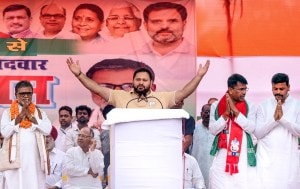Slowing further
Bad news from industrial figures. Government must focus on reform,and RBI must be cautious
The index of industrial production,or IIP,for August is out,and the news isnt good: 4.1 per cent is lower than expected,and lower too than last years 4.5 per cent. Danger continues to gather about the India growth story,clearly. Decomposing the numbers doesnt make it any better,though it helps us understand whats going wrong. Last August,mining grew 5.9 per cent; this August,it shrank by 3.4 per cent. Iron-ore extraction has broken down in Karnataka thanks to Supreme Court intervention; coal mining has stopped in Andhra because of the Telangana agitation; and confusion about environmental clearances has added to that. Clearly,each of these is a policy-driven failure. Then theres manufacturing itself,which grew at only 4.5 per cent; the general slowdown was reflected in the figures from Central excise,which fell 8.7 per cent during September.
Nor is it only industrial production which is suffering currently. The HSBC Purchasing Managers Index for September 2011 dropped below 50 for the first time in over two years,since the height of the financial crisis. The PMI quantifies the sentiment among those in the service sector who deal with contracts and purchases,and that drop indicates a significant downturn in expectations. The prime ministers economic advisory council advised caution in interpreting the PMI numbers,but theres little doubt services will not help drive up the numbers which manufacturing is letting slide. And although exports strengthened in September,the news from the rest of the world is dire: Europe is still in crisis,and the Chinese and the Americans appear on the brink of a trade war. No help from that column,either.
The only option,clearly,is a laser focus on reform. Two things are worth noting: first,that the decline in mining is almost entirely due to various political economy factors,which a proper clean-up of the sector,and of political issues such as Telangana that impact it,could have fixed. Second,one of the few good performers was the electricity sector,which comes after state electricity boards were nudged into reforming their tariffs. It is also necessary to recognise the RBIs continued efforts to anchor inflationary expectations are not affecting inflation because of the central banks credibility problems,and its inability to deliver a short,sharp monetary shock,and the nature of the cost-push inflation but are,very seriously,hurting growth. The RBI needs to consider its next move with great caution.







- 01
- 02
- 03
- 04
- 05
























